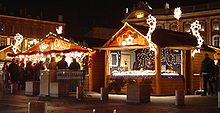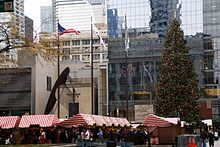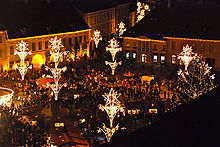- Christmas market
-
A Christmas market, also known as Christkindlmarkt, Christkindlesmarkt, Christkindlmarket, and Weihnachtsmarkt, is a street market associated with the celebration of Christmas during the four weeks of Advent. These markets originated in Germany, Austria and Alsace but are now being held in many other countries.
Contents
History
The history of Christmas markets goes back to the Late Middle Ages in the German speaking part of Europe. The Dresden Christmas market, first held in 1434, is one of the oldest Christmas markets. It attracts between 1.5 and 2 million visitors a year and has over 250 stalls. The Bautzen Christmas market was even older, first being mentioned in records in 1384.[1] The Vienna "December market" was a kind of forerunner of the Christmas market and dates back to 1294.[citation needed]
In many towns in Germany and Austria, Advent is usually ushered in with the opening of the Christmas market or "Weihnachtsmarkt". In southern Germany and Austria it is sometimes called a "Christkind(e)l(s)markt" (German language, literally meaning "Christ child market"). Generally held in the town square and adjacent pedestrian zones, the market sells food, drink, and seasonal items from open-air stalls, accompanied by traditional singing and dancing. On opening nights (and in some towns more often) onlookers welcome the "Christkind", or boy Jesus, acted out by a local child.
Attractions and stalls
Popular attractions at the market include the Nativity Scene (a crèche or crib), Zwetschgamännla (figures made of decorated dried plums), Nussknacker (carved Nutcrackers), Gebrannte Mandeln (candied, toasted almonds), traditional Christmas cookies such as Lebkuchen and Magenbrot (both forms of soft gingerbread), Christstollen (Stollen), a sort of egg bread with candied fruit, Bratwurst, and for many visitors one of the highlights of the market: Glühwein, hot mulled wine (with or without a shot of brandy), or Eierpunsch (an egg-based warm alcoholic drink). Both help stave off the cold winter air which sometimes dips below freezing. Many other handmade items, toys, books, Christmas tree decorations and ornaments (and in recent years less useful gadgets) can be found at a Christkindlmarkt.
Markets around the world
See also: List of Christmas marketsFamous Christmas markets are held in the cities of Dortmund, Erfurt, Nuremberg, Dresden, Stuttgart and Augsburg making them popular tourist attractions.[2][3] The Nuremberg and Dresden markets draw about two million people each year; the Stuttgart market attracts more than three million visitors and the Dortmund market can claim one of the biggest Christmas markets in Germany, with over 300 stalls packed around a gigantic Christmas tree creation that stands 45 metres tall.
Strasbourg, in Alsace, France, has been holding a Christmas market, "Christkindelsmärik," around its cathedral since 1570, when it was part of the Holy Roman Empire of German Nation.[4]
Christmas markets are traditional in Alsace and most of the towns have their local Christmas market.
In 1982 Lincoln, England established an annual Christmas market in early December, and this remains the most extensive such market by area in the United Kingdom, with a claimed total of over 300 stalls attracting more than 100,000 visitors over its four days. Large Christmas markets are also held in England in Leeds and Birmingham, with visiting traders from Frankfurt. The Birmingham Christmas Market was the largest in the UK in 2009 attracting over 2.8 million visitors over four weeks.[5][6] Liverpool, Glasgow, Manchester,[7] and Nottingham also hold similar markets; with Manchester having around 200 stalls in 2007, attracting nearly 1.2 million visitors over five weeks.
German immigrants also brought the Christmas market celebrations to the United States.[8][9][10][11][12]
Since 2007, a traditional Christmas market is held for the first time in Sibiu, Romania. The first of its kind in Romania, it is inspired by Viennese Christmas markets. It was held in the "Lesser Square" (Piața Mică) had 38 small stalls, a small stage and an area dedicated to children, having several mechanical attractions installed there. The 2008 edition was held in the "Grand Square" and had the same number of stalls, but a bigger stage was installed, where Christmas carols concerts were held. A new attraction was an ice skating rink. The third edition, in 2009, was also held in the Grand Square of the town Sibiu, has over 70 stalls where merchants from all over Romania sell their goods. A stage, an ice skating rink and an area dedicated to mechanical installations for children are installed.[13]
Gallery
-
Mulled wine on Christmas market in Strasbourg, France
-
German Christmas market in Millennium Square, Leeds, UK
-
Christmas market at Gendarmenmarkt, Berlin
-
Christmas market in Erfurt
-
Christmas market in Stuttgart, Baden-Württemberg
-
Christkindlimärt in Rapperswil, Switzerland
-
Julmarknad in Gamla stan, Stockholm
See also
References
- ^ Bautzen Christmas Market
- ^ Christmas City Nuremberg Stadt Nürnberg, retrieved 8 July 2007
- ^ Stuttgart Christmas Market Stuttgart Marketing, retrieved 8 July 2007
- ^ Noël à Strasbourg Retrieved 8 July 2007
- ^ Frankfurt Christmas Market in Birmingham Birmingham City Council, 9 October 2007, retrieved 1 December 2007
- ^ "Another Record year for Frankfurt Christmas Market". Birmingham City Council. http://www.birminghamnewsroom.com/?p=6019. Retrieved 29 September 2010.
- ^ Manchester City Council - report on specialist markets 2008 Manchester City Council, 5 February 2008, retrieved 3 December 2009
- ^ CHRISTKINDLMARKT BETHLEHEM ArtsQuest (2006), retrieved 8 July 2007
- ^ . Christkindlmarket Chicago German American Chamber of Commerce of the Midwest, 17 November 2006, retrieved 8 July 2007
- ^ Denver Christkindl Market German American Chamber of Commerce Colorado Chapter. (2006), retrieved 8 July 2007
- ^ Mifflinburg Christkindl Market
- ^ Christkindlmarkt 2007 German-American Society of Tulsa, 1 May 2007, retrieved 8 July 2007
- ^ Târgul de Crăciun din Sibiu
Further reading
- Bakst, Alex: "A Visit to Germany's Christmas Markets", Spiegel Online 7 December 2006
- Zug, J.D. (1991): German-American Life: Recipes and Traditions, Iowa City: Penfield Press
External links
- Overview of all German Christmas Markets
- German Christmas Markets 2011 information
- Web Online Exercise about Christmas Markets in Germany
- List of worldwide Christmas Markets
- List of Christmas markets in South Tyrol - Italy
- Christmas markets throughout Germany & Europe
- Deepdale Christmas Market on the north Norfolk coast
Categories:- Christmas markets
- Christmas in Germany
- Christmas events and celebrations
- Christmas traditions
-
Wikimedia Foundation. 2010.



















